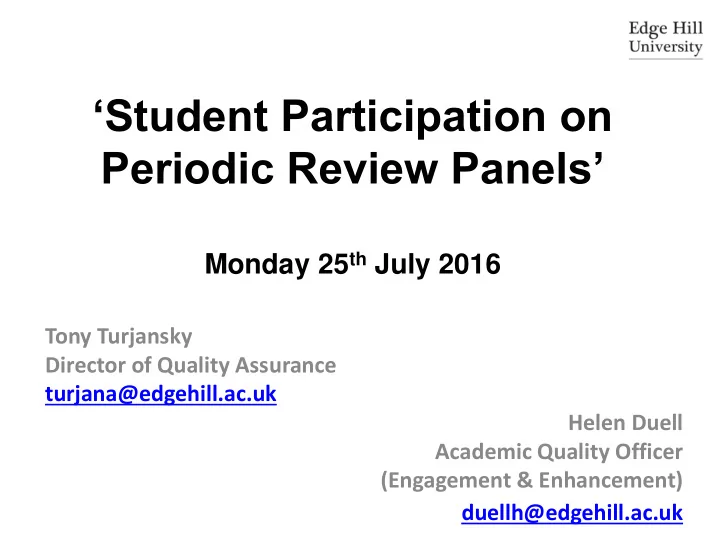

‘Student Participation on Periodic Review Panels’ Monday 25 th July 2016 Tony Turjansky Director of Quality Assurance turjana@edgehill.ac.uk Helen Duell Academic Quality Officer (Engagement & Enhancement) duellh@edgehill.ac.uk
Aims This session will aim to locate Periodic Review within: – National HE quality expectations: • UK Quality Code for Higher Education – Edge Hill’s own quality strategy – Student involvement in the process – Supporting guidance and information
UK Quality Code for Higher Education • Governs all HE providers in setting and maintaining academic standards, quality of learning opportunities, enhancement and public information • Defined by a national HE level framework and subject benchmarks (PART A), additional guidance on securing and enhancing the quality of students’ learning opportunities (PART B) and guidance concerning information published by HE providers (PART C)
UK QUALITY CODE FOR HIGHER EDUCATION Part B: Assuring and enhancing Part A: Setting and maintaining academic quality academic standards B1: Programme design, development and A1: UK and European reference approval points for academic standards B2: Recruitment, selection and admission to higher education A2: Degree-awarding bodies' B3: Learning and teaching reference points for academic B4: Enabling student development and standards achievement A3: Securing academic standards B5: Student engagement and an outcomes-based approach B6: Assessment of students and the to academic awards recognition of prior learning B7: External examining B8: Programme monitoring and review B9: Academic appeals and student Part C: Information about complaints higher education B10: Managing higher education provision provision with others B11: Research degrees
Edge Hill’s quality strategy • We embed the national Quality Code within our regulations and quality management processes: – Validation - detailed panel scrutiny of new programme proposals – Annual Monitoring (AMR) – includes module evaluation – External examiners – confirm standards through their annual reports – Periodic review of each academic department/ area every 5 years (including programme ‘re - validation’)
Aims of Periodic Review • A five-yearly review of all existing programmes in a department/cognate discipline area conducted with a view to recommending their continuing approval (a.k.a. ‘re - validation’) – Includes both campus-based and collaborative/ distance learning provision • Delivers a confidence judgement in the capability and capacity of the department/area to deliver its awards • Reviews the shape and direction of the curriculum: – Market drivers – Academic benchmarks – Influence of professional, statutory and regulatory bodies (PSRBs) • Considers drivers for change and the department’s strategic response/ ‘5 year plan’ – Gives direction to annual Autumn Monitoring and Spring Planning, exposing departments’ plans and aspirations to both Faculty and University planners and influencers
Aims of Periodic Review (2) • Confirms academic standards (using programme performance data and feedback from external examiners) • (Using student feedback) reviews the quality of student learning opportunities : – Teaching, assessment and student support – Teaching staff (capacity, qualifications, professional development) – Learning resources (central and course-specific; quality, sufficiency) – Course organisation (including placements, where relevant) – Quality assurance and enhancement
What does Periodic Review look like? • Critical Review document – Authored by Head of Department/Area and programme teams • Critical evaluation of data on: programme recruitment, retention, achievement (modules) , progression and completion (awards) ; NSS outcomes; graduate destinations (DLHE); external examiner reports; professional body reports (where available); previous annual monitoring reports (supports trend analysis) • First Panel Meeting to agree ‘lines of enquiry’ and foci of pre -reading • Focus group meetings with students and employers/ alumni (minus department staff) • Chair’s pre -review event meeting with departmental leads • Main Review Event – Internal panel chair, secretary, 2 members, 1 student member to bring a learner perspective – 2 external academic/professional experts nominated by the Department/Area – Discussions with the Department/Area • Recommendations to Department/Area, Faculty and University • Identification of good practice for University-wide enhancement
Critical Review headings • Strategy for development • Curriculum & Benchmarking • Assessment & Achievement • Teaching & Learning • Student Recruitment, Support & Guidance • Student Retention & Progression • Staffing, Staff Development & Research • Other Resources • Course Organisation & Management • Quality Management & Enhancement • Assessment of Risk & Action Plan
Conduct of review meetings • Collegial – not adversarial! • Interrogative - but not an ‘interrogation’! • Role of the Chair is crucial to managing the discussions • Secretary (AQO) provides expert guidance on ‘process’ and keeps a running list of issues that may result in recommendations
Outcomes of the event • Reassurance to the University that: – Programmes are in good health and should continue in validation (with or without exceptions) – The Department/Area has the capacity and capability to continue delivering its programmes (and to develop new ones) • Recommendations in respect of further development: – For the Department/Area – For the Faculty – For the University
Outcomes of the event (contd) • Secretary produces draft report • ‘Chair’s Approved Draft’ is circulated to the rest of the panel for verification and to the proposing team for confirmation of factual accuracy • Department/Area responds formally to the panel’s recommendations • Confirmed report is signed off by the Chair and goes to the next available meeting of the Academic Quality Enhancement Committee for consideration and approval (and delegation of any University-level recommendations)
Periodic reviews in November/December 2016 (dates to be confirmed) FAS Business School FAS Computing FOE Professional Learning (formerly ‘Postgraduate Professional Education’) FOE Primary Education FOE Early Years Education
Periodic Review documentation • Templates are available at http://www.edgehill.ac.uk/aqdu/periodic- review/ including: – Student focus group standard agenda – Skeleton agenda for the main periodic review event – Critical Review document template • ‘Preparing for Periodic Review’ booklet (based on QMH Chapter 3)
http://www.qaa.ac.uk/en/ Publications/Documents/ quality-code-brief- guide.pdf
Any questions? Thanks for your attention!
Recommend
More recommend